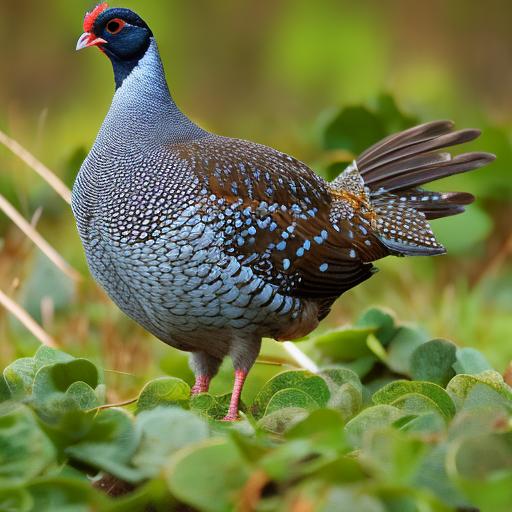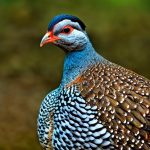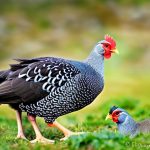Guinea fowl are known for their curious and active nature. They are social birds that prefer to move in flocks, and they are highly alert and vigilant, making them excellent watchdogs for your property. However, their natural curiosity and foraging behavior can lead them to explore areas where they are not welcome, such as gardens, flower beds, and even outdoor dining areas. Guinea fowl are also known for their loud calls, which can be disruptive in residential areas. Understanding their behavior is crucial in finding effective ways to manage and control their presence on your property.
Guinea fowl are diurnal birds, meaning they are most active during the day. They spend much of their time foraging for insects, seeds, and small plants. They are also known to be excellent flyers and can roost in trees or on top of buildings. Their natural instinct to roost in high places can lead them to perch on roofs, fences, or other structures on your property. Additionally, guinea fowl are highly territorial and can become aggressive towards other birds or animals that they perceive as a threat to their territory. Understanding these behavioral traits can help you develop strategies to deter guinea fowl from causing damage or disruption on your property.
Key Takeaways
- Guinea fowl are social birds that prefer to roost in trees and are easily spooked by sudden movements or loud noises.
- Creating a physical barrier such as a fence or netting can help keep guinea fowl out of specific areas.
- Using natural repellents like citrus peels or predator urine can deter guinea fowl from entering unwanted areas.
- Providing alternative roosting spots such as designated trees or structures can redirect guinea fowl away from sensitive areas.
- Implementing scare tactics like motion-activated sprinklers or noise-making devices can startle guinea fowl and discourage them from returning to a specific area.
- Consistent monitoring and maintenance of barriers, repellents, and scare tactics is essential for long-term success in managing guinea fowl behavior.
- Seeking professional help from wildlife experts or pest control professionals may be necessary for persistent guinea fowl issues.
Creating a Barrier
One effective way to manage guinea fowl on your property is to create physical barriers that prevent them from accessing areas where they are not welcome. This can include installing fences or netting around gardens and flower beds to keep guinea fowl from foraging and causing damage to plants. It is important to ensure that the barriers are tall enough to prevent the birds from flying over them, as guinea fowl are capable of flying to high perches. Additionally, it is important to regularly inspect and maintain the barriers to ensure that there are no gaps or openings that guinea fowl can exploit to gain access to restricted areas.
Another option for creating a barrier is to use visual deterrents such as scarecrows or reflective tape. These visual cues can help deter guinea fowl from entering specific areas by creating a sense of unease or danger. It is important to regularly move and change the placement of these visual deterrents to prevent guinea fowl from becoming accustomed to them. Creating a physical barrier combined with visual deterrents can be an effective way to manage guinea fowl on your property and prevent them from causing damage or disruption.
Using Repellents
In addition to physical barriers, using repellents can be an effective way to deter guinea fowl from accessing specific areas on your property. There are various types of repellents available, including chemical sprays, natural deterrents, and ultrasonic devices. Chemical sprays can be applied to plants or surfaces to create an unpleasant taste or smell that deters guinea fowl from foraging or roosting in specific areas. Natural deterrents such as predator urine or citrus scents can also be effective in deterring guinea fowl by creating a sense of danger or discomfort.
Ultrasonic devices emit high-frequency sounds that are unpleasant to guinea fowl, causing them to avoid specific areas where the devices are installed. It is important to carefully follow the instructions for using repellents and regularly reapply them as needed to maintain their effectiveness. Using a combination of different types of repellents can help increase their overall effectiveness in deterring guinea fowl from causing damage or disruption on your property.
Providing Alternative Roosting Spots
One way to manage guinea fowl on your property is to provide alternative roosting spots that are away from areas where they are not welcome. This can include installing roosting poles or platforms in open areas away from buildings or gardens. Providing alternative roosting spots can help redirect guinea fowl away from structures where they may cause damage or disruption. It is important to regularly clean and maintain these roosting spots to encourage guinea fowl to use them instead of perching on buildings or other structures.
Another option is to provide nesting boxes or shelters specifically designed for guinea fowl. These can be placed in secluded areas away from buildings or gardens to encourage guinea fowl to roost and nest in designated spots. Providing alternative roosting spots can help manage guinea fowl on your property by giving them a suitable place to roost and nest without causing damage or disruption.
Implementing Scare Tactics
Implementing scare tactics can be an effective way to deter guinea fowl from accessing specific areas on your property. This can include using visual deterrents such as scarecrows, reflective tape, or predator decoys that create a sense of danger or unease for the birds. It is important to regularly move and change the placement of these scare tactics to prevent guinea fowl from becoming accustomed to them.
Another option is to use noise deterrents such as loud noises or motion-activated devices that startle guinea fowl when they approach restricted areas. These scare tactics can help create a sense of danger or discomfort for the birds, deterring them from causing damage or disruption on your property. Implementing a combination of visual and noise scare tactics can be an effective way to manage guinea fowl and prevent them from accessing specific areas where they are not welcome.
Consistent Monitoring and Maintenance

Consistent monitoring and maintenance are crucial in managing guinea fowl on your property. Regularly inspecting fences, barriers, and repellents can help identify any gaps or damage that may allow guinea fowl to access restricted areas. It is important to promptly repair any damage and reapply repellents as needed to maintain their effectiveness. Additionally, regularly cleaning and maintaining alternative roosting spots can help encourage guinea fowl to use designated areas instead of perching on buildings or other structures.
Consistent monitoring also allows you to assess the effectiveness of scare tactics and make adjustments as needed. This may include changing the placement of visual deterrents or adjusting the settings of noise deterrents to ensure they continue to effectively deter guinea fowl from causing damage or disruption on your property. By consistently monitoring and maintaining your efforts to manage guinea fowl, you can effectively prevent them from accessing specific areas where they are not welcome.
Seeking Professional Help
If you are struggling to manage guinea fowl on your property, seeking professional help may be necessary. Wildlife management professionals have the knowledge and experience to develop effective strategies for managing guinea fowl and preventing them from causing damage or disruption. They can assess your property and develop a customized plan that may include physical barriers, repellents, alternative roosting spots, and scare tactics tailored to your specific needs.
Professional wildlife management services also have access to specialized equipment and resources that may not be readily available to homeowners. This can include advanced repellents, noise deterrents, and trapping methods that can effectively manage guinea fowl populations on your property. By seeking professional help, you can ensure that you are implementing the most effective strategies for managing guinea fowl and preventing them from causing damage or disruption on your property.
In conclusion, understanding guinea fowl behavior is crucial in developing effective strategies for managing them on your property. Creating physical barriers, using repellents, providing alternative roosting spots, implementing scare tactics, consistent monitoring and maintenance, and seeking professional help are all important aspects of managing guinea fowl populations and preventing them from causing damage or disruption. By implementing these strategies, you can effectively manage guinea fowl on your property and create a harmonious coexistence with these curious and active birds.
If you’re looking for ways to keep guinea fowl off your porch, you may also be interested in setting up a garden chicken coop. Creating a safe and comfortable space for your poultry can help prevent them from wandering onto your porch. Check out this helpful article on poultrywizard.com for tips on setting up a garden chicken coop that will keep your feathered friends happy and secure.
FAQs
What are guinea fowl?
Guinea fowl are a type of bird native to Africa. They are known for their distinctive spotted feathers and loud, chattering calls.
Why do guinea fowl come onto the porch?
Guinea fowl are known to be curious and may come onto a porch in search of food, shelter, or simply out of curiosity.
How can I keep guinea fowl off my porch?
There are several methods to keep guinea fowl off your porch, including using physical barriers such as netting or fencing, using repellents such as motion-activated sprinklers or noise devices, and removing any potential food sources from the area.
Are there any natural deterrents to keep guinea fowl away?
Some natural deterrents to keep guinea fowl away from your porch include planting thorny bushes or using natural scents such as citrus or garlic to repel them.
Is it legal to harm or kill guinea fowl?
In many places, guinea fowl are protected under wildlife conservation laws, so it is important to check local regulations before attempting to harm or kill them. It is often best to use non-lethal methods to deter them from your porch.
Meet Walter, the feathered-friend fanatic of Florida! Nestled in the sunshine state, Walter struts through life with his feathered companions, clucking his way to happiness. With a coop that’s fancier than a five-star hotel, he’s the Don Juan of the chicken world. When he’s not teaching his hens to do the cha-cha, you’ll find him in a heated debate with his prized rooster, Sir Clucks-a-Lot. Walter’s poultry passion is no yolk; he’s the sunny-side-up guy you never knew you needed in your flock of friends!







